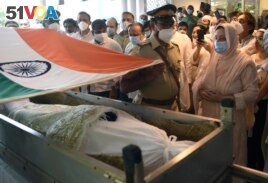Dilip Kumar, one of Bollywood’s most famous actors has died. The Indian actor died Wednesday in a hospital in Mumbai after a long illness. He was 98.
Kumar was known as the “Tragedy King.” He played many serious roles. In several movies, the characters he played died as a heartbroken lover or from too much alcohol.
He was known as Bollywood’s only Method actor. Method acting is a way of performing in which actors closely identify with the characters they play. Many of Kumar’s performances were very emotional.
Kumar was hospitalized two times last month with trouble breathing. His family announced his death in a tweet “with a heavy heart.”
Indian Prime Minister Narendra Modi said in a tweet, “Dilip Kumar will be remembered as a cinematic legend.” His death is “a loss to our cultural world.”
Amitabh Bachchan is another Bollywood star. He tweeted: “Whenever the history of Indian Cinema will be written, it shall always be ‘before Dilip Kumar, and after Dilip Kumar.
Kumar was given a state funeral. His body was covered by the Indian flag. He was buried in a Muslim cemetery in Mumbai.

A police officer places an Indian national flag over the coffin of Bollywood icon Dilip Kumar during his funeral in Mumbai, India, Wednesday, July 7, 2021. (Kunal Patil/Pool photo via AP)
Kumar was born Muhammad Yusuf Khan, a Muslim, on December 11, 1922. His family is from Peshawar, in what later became Pakistan when the country split.
Kumar was very popular in Pakistan. In 1998, he was awarded Pakistan’s highest civilian honor. He is the only Indian citizen to receive it.
Pakistan Prime Minister Imran Khan said he was saddened to learn of Kumar’s death. “For my generation, Dilip Kumar was the greatest and most versatile actor,” he tweeted.
He changed his name as he began his work in Bollywood, the Hindi-language film industry centered in Mumbai. His first film was Jwar Bhata, or Sea Tides, in 1944.
Kumar’s career lasted more than 60 years with over 60 films. His first major hits were Jugnu, or Firefly, in 1947 and the 1948 film Shaheed, or Martyr.
He played many different characters over the years. But his role as a Muslim prince in the historical film Mughal-e-Azam gained him worldwide fame.
The popular movie Aan in 1952 was his first film in color. It was also the first of many lighter roles, as he tried to change his “Tragedy King” image.
He starred in many social drama films like Footpath, New Era, Traveller, and Message in the 1950s. His last film was Fort in 1998.
Indian media reports say he turned down the part of Sherif Ali in David Lean’s Lawrence of Arabia in 1962. That part went instead to Egyptian actor Omar Sharif.
In 1994, he was given the highest honor for Indian cinema. He also served in the upper house of Indian Parliament after being nominated for a six-year term.
Kumar is survived by his wife, the actor Saira Banu.
I’m Dan Novak.
Ashok Sharma reported this story for The Associated Press. Dan Novak adapted for VOA Learning English. Mario Ritter, Jr. was the editor.
_________________________________________________
Words in This Story
tragedy— n. a bad event that causes great sadness and often involves someone's death
role –n. the part an actor plays in a performance
character –n. a person who appears in a book, play, movie, or show
cinematic — adj. of or relating to movies
cemetery — n. a place where dead people are buried
era — n. a period of time that is associated with a particular quality, event, person, etc.
versatile — adj. able to do many different things
career –n. a job or profession that someone has for a long time
